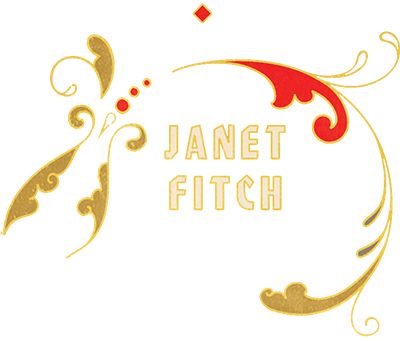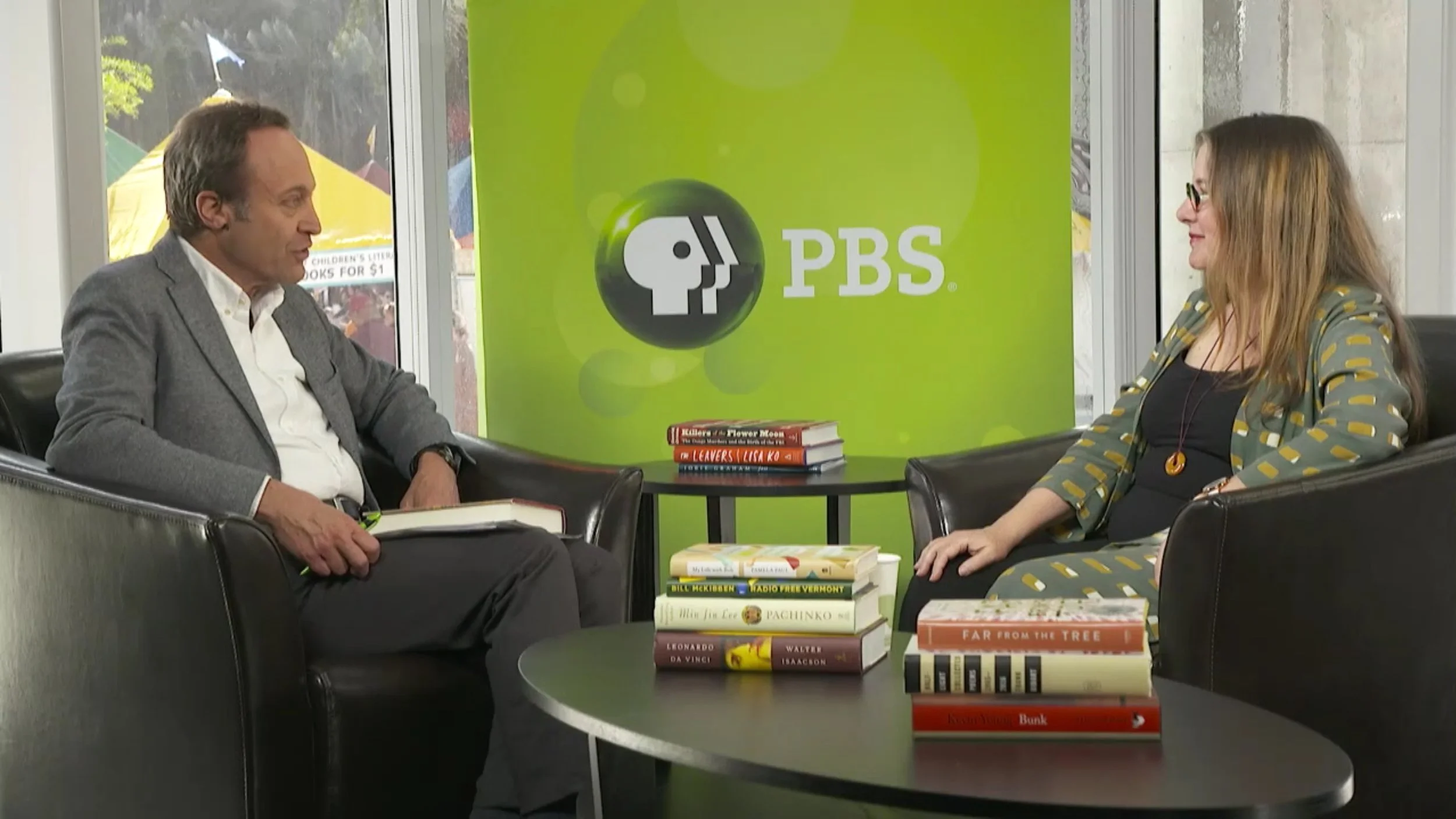A remarkable interview with the esteemed Connie Martinson conducted in 1999, to honor her passing this March, 2023. What a sensitive, insightful reader.
An interview on the Rock is Lit podcast with Christy Alexander Hallberg about Paint it Black and the significance of music in the novel. Let’s talk rock! Rock is Lit
Gerry Fialka is a mad genius, and doing an interview with him is like none other. Wide ranging, left-field, and completely surprising q and a’s, he’s been at this for years, I’ve done one years before but now we have YouTube. Always a pleasure, always eye-opening. You never know what you really think until someone throws you questions. Is there a soul? Can machines think? Gerry leads, among other things, a longstanding Finnegan’s Wake reading group.
"Finding the true self, asking the fundamental questions, being at agency, is a noble venture, and worth the pain of growth.” Janet Fitch on her central project, beginning with White Oleander all the way to Marina M. and Chimes of a Lost Cathedral. Celebrating 20 years of White Oleander--On the Literary Hub: “Where was my Hero’s Journey?”
"I think what all my books have in common is that I take the internal lives and moral development of women with utmost seriousness."
Janet Fitch and Amber Tamblyn in an ongoing conversation about feminism, politics, history, and more on
"I knew that Marina was born at the turn of the century and that her development would mirror and incorporate the history of the revolution and the literary history of the time as well — whom she admired, whom she would emulate. And that was basically all. The rest grew organically, moving back and forth, between her individuation as a woman, an artist, and a maturing moral entity, and the unfolding of the revolution — an intricately linked micro and macro story.”
—Wide ranging conversation with Boris Dralyuk on the creation of MARINA M. and CHIMES OF A LOST CATHEDRAL in the Los Angeles Review of Books
"When someone is a poet, that’s not a suit you put on and take off. It’s a way of being in the world — a vocation, a calling. Russia treasures its poets — they represent the essence of bravery and freedom, beauty and truth. Russians turn to poetry to express the soul of the times and hang onto what it means to be human in unbelievably difficult times."
On CHIMES OF A LOST CATHEDRAL In the San Diego Union Tribune.
Novelist Janet Fitch, author of Chimes of a Lost Cathedral, joins Barbara DeMarco-Barrett to talk about her new novel published by Little Brown.
(Broadcast date: July 31, 2019)
Janet Fitch is a smart, award-winning author whose books include "White Oleander" and "Paint it Black." Both were best-sellers and have been made into movies.
Fitch’s new book, "Chimes of a Lost Cathedral", picks up the story of her historical fiction from 2017, "The Revolution of Marina M." She talks about the process of writing, the ways in which the Russian Revolution led her to see comparisons to the current political moment in the U.S. and how the two pieces of the story she has told are two parts of a whole.
To listen to this interview please visit the link below
By Barbara DeMarco-Barrett
I first became aware of novelist Janet Fitch when White Oleander, an Oprah Book Club selection made into a feature film, was first published. I loved the novel and had her on my radio show. I remember being entranced with her alacrity with metaphor and simile and asked her, as we sat in my car in a Starbucks parking lot near the University of California, Irvine Campus where my show broadcasts, how she came up with such original similes and metaphors.
“Will you stare at a dripping faucet for hours until it becomes something else?” I asked her and she said, “Yes, yes I will.”
Discussing the boons and pitfalls of writing historical fiction, about living in history, Russia in the news and other timely topics with author and journalist Jennifer Haupt for Psychology Today's "One True Thing" column:
" I had no idea that people would become as obsessed with Russia as I am. You can’t predict the future, which is another theme of the book. You live inside history. You don’t know what’s going to happen. They didn’t know during the Russian revolution and we don’t know now."
Published November 22, 2017
Janet Fitch discusses The Revolution of Marina M. with Jeffrey Brown of the PBS NewsHour at the 2017 Miami Book Fair.
“To tell my story, I have to know how it felt to stand in lines at the district soviet trying to get papers one needed to work, and listening to rumors of what was said in those rooms. Hungry, ill-clothed, hopeful, stressed out. That’s the room I want to be in. Not how people shape history, but how history shapes us, how it distorts our stories, what it calls upon us to do. Who we become under its pressure.”
An essay for the LA Times' Jacket Copy, “Janet Fitch explains what it took to go back to Russia 100 years ago in 'The Revolution of Marina M.',” November 10, 2017.
“I had to go back to Russia, to the Revolution, to uncover what [Marina] had experienced in those turbulent years, and how they had marked her. ”
An essay for PowellsBooks.Blog, “Living in Interesting Times,” on a few of the obsessions that lead me to write Marina's story, November 9, 2017.
“I think you become a more effective reader by reading in big blocks instead of trying to catch a page here and there. I read in the morning instead of reading the newspaper.”
Q&A from Quora, “How to Become an Everyday Reader,” in response to the question, How can people go about becoming more effective readers in their everyday lives?, Huffington Post, November 7, 2017.
“‘I’ve known fiery people,’ Fitch says. ‘They’re glorious, they believe, they’re willing to stick their necks out, they’re willing to fall a long way, they make a mess—for themselves and others—but they live in a large way.’”
Interview by Trisha Ping for BookPage, November 2017.
“All of my characters find themselves in drastically altered situations. …[W]e show ourselves when we’re put into stressful situations of sudden change. ”
Interview with Cody Drabble of Capital Public Radio, Sacramento, November 7, 2017.
“Marina M. encourages us to reconcile with age-old questions, endure with dignity, and remember our history. Fitch says the novel is about a girl becoming a woman when she starts to see the consequences of her choices.”
“Researcher and Writer Delves into the Russian Revolution”
Joshua Balicki, The Daily Iowan, November 7, 2017
“Creativity is a way of living in the world, open to new ideas, actively seeking out new experiences, of finding something that excites you….”
Q&A from Quora, “Tapping Into Your Childlike Creativity Is Easier Than You Think, in response to the question, How can people develop their creativity?,” INC.com, November 7, 2017.
Janet speaks with host Jill Adams about her new book, The Revolution of Marina M., in this all-female edition of People TV's Shelf Life. Segment starts at 1:18.





